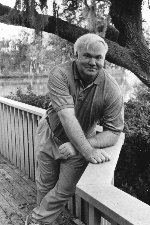Pat Conroy Backlist
Translation rights to Pat Conroy backlist as below are available from Marly Rusoff Literary Agency
THE PRINCE OF TIDES |
|
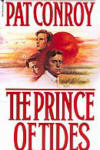 |
Publisher Houghton Mifflin, 1986 In this best-selling novel, Pat Conroy tells the story of Tom Wingo, his twin sister, Savannah, and the dark and violent past of the family into which they were born.Set in New York City and the low-country of South Carolina, THE PRINCE OF TIDES opens when Tom, a high school football coach whose marriage and career are crumbling, flies from South Carolina to New York after learning of his twin sister’s suicide attempt. Savannah is one of the most gifted poets of her generation, and both the cadenced beauty of her art and the jumbled cries of her illness are clues to the too-long-hidden story of her wounded family. In the paneled offices and luxurious restaurants of New York City, Tom and Susan Lowenstein, Savannah’s psychiatrist, unravel a history of violence, abandonment, commitment, and love. And Tom realizes that trying to save his sister is perhaps his last chance to save himself. With passion and a rare gift of language, Pat Conroy moves from present to past, tracing the amazing history of the Wingos from World War II through the final days of the war in Vietnam and into the 1980s, drawing a rich range of characters: the lovable, crazy Mr. Fruit, who for decades has wordlessly directed traffic at the same intersection in the southern town of Colleton; Reese Newbury, the ruthless, patrician land speculator who threatens the Wingos’ only secure worldly possession, Melrose Island; Herbert Woodruff, Susan Lowenstein’s husband, a world-famous violinist; Tolitha Wingo, Savannah’s mentor and eccentric grandmother, the first real feminist in the Wingo family. Pat Conroy reveals the lives of his characters with surpassing depth and power, capturing the vanishing beauty of the South Carolina low-country and a lost way of life. |
THE LORDS OF DISCIPLINE |
|
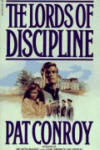 |
Publisher Houghton Mifflin, 1980 THE LORDS OF DISCIPLINE is a novel about coming of age, brotherhood, betrayal, and a man’s forging of his own personal code of honor. The scene is the venerable Carolina Military Institute in Charleston, in the fall of 1966. The first black cadet has been admitted to the college, and Will McLean, a senior on the cadets’ honor court, is asked to keep an eye on him. There is a rumor that a secret organization, The Ten, may be trying to run the black student off campus.An outsider by nature, Will plays basketball for a school that prizes military prowess but belittles athletics. He riles his gung-ho, conservative roommates by daring to question the escalating Vietnam war. Off campus, though, he is less sure of himself, in his tender but uncertain romance with the haunting Annie Kate Gervais, a native of the classically beautiful Charleston — with its Federal mansions and fragrant gardens — that captivates and threatens the country boy in Will. THE LORDS OF DISCIPLINE shows us cadets desperate to prove they are men in a regimented, cruel world – and one determined to be a man in is own way, whose search for the truth ultimately leads him and his beloved friends into tragic conflict with a corrupt system. Right in humor and suspense, abounding in a rare honesty and generosity of feeling, and written with magnificent force of language, this new novel shows Pat Conroy to be one of the strongest fictional voices in a generation. |
THE GREAT SANTINI |
|
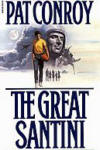 |
Publisher Houghton Mifflin, 1976 THE GREAT SANTINI takes us into the family life of a fighter pilot. Bull Meecham is the epitome of the Marine officer — as tough a disciplinarian at home as at the base. Rebellion, or even difference of opinion, is not tolerated. Objections are met with the statement “The Great Santini has spoken.” As the oldest child, Ben takes the brunt of his father’s criticism. His attempts to stand up for himself or his mother and sister are contemptuously dismissed. His feelings for his father are a mixture of hate and fear, reluctant pride in his prowess, and unacknowledged love.The Marine Corps and flying are the most important things in Bull’s life. Next come his image as a tough guy, the Catholic Church, his old buddies, his wife and children. His sons are destined to become Marine pilots, his daughters to provide their husbands (Marine, naturally) with a good home and more fodder for the Corps. Ben is eighteen and a born athlete. So his father’s fierce drive for a successful son is concentrated on him and nothing less than perfection is considered acceptable — a perfection of which Bull is the sole judge. Ben must learn that in a game, sportsmanship should go by the board when necessary; what matters is to win, regardless of the means. This is the story of a boy’s determination to be himself, whatever that may be. It is violent, shocking, funny, moving, and overwhelmingly real. From the early pages, with Bull’s wife and children waiting at the airport to welcome the Great Santini back into their midst, to the bittersweet ending, the reader’s interest and emotions are fixed upon the fluctuating fortunes of the Meecham family. |
THE WATER IS WIDE |
|
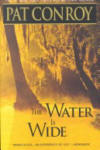 |
Publisher Houghton Mifflin, 1972 “Someone told me about Yamacraw, said they needed a teacher, that the teacher who had been there thirty-nine years was quitting, and they couldn’t get anyone else. This looked like the perfect opportunity for me to get rid of my do-gooder tendencies. And so I went to Yamacraw Island. They gave me a boat, told me “Good Luck,” and that was all they told me. “The first thing I learned when I got there was that fourteen of the seventeen kids in grades five through eight read below the first grade level. Five of the kids did not know the alphabet; five of the kids also did not know how to add one and one, two and two, things I thought rather basic in the education of most people. I also discovered that most of the kids have been trained to obey the whip and the belt and the hand. What they feared most was physical punishment. Everyone in my class was interrupted by the sound of leather on flesh from the next room. And these kids evidently had become accustomed to corporal punishment and they would learn only in response to corporal punishment. The thing I thought I had to do first was to not beat the kids but to let them know that education was fun.” |
THE BOO |
|
 |
Old New York Bookshop Press, 1970 In 1961, Lt. Colonel Nugent Courvoisie accepted the job as assistant commandant of cadets at The Citadel, the military college of South Carolina. During the next seven years, The Boo, as the cadets called him, was in charge of meting out punishment to those young men accused of breaking Citadel law. THE BOO was a harsh guardian of justice, but he was also an extremely compassionate and sensitive individual who cared deeply about the young men placed under his jurisdiction. If he was often stern and uncompromising, he was also concerned and understanding. He possessed a special ability in dealing with the problem cadet; the boy who found The Citadel too difficult or too confining; the boy from the broken home, or the boy forced to go to a military college by parents who had failed him. He empathized with cadets who were stifled by the system and, in his own way, tried to guide them through the obstacles that inevitably littered the path to graduation.THE BOO was many things to many people. During the years as assistant commandant, he was part analyst, part confessor, part detective, part father, part son of a bitch, and all soldier. This is the story of THE BOO and the story of The Citadel from 1961-1968. It is the story of young men and the man they turned to for laughter, for help, and for inspiration. |
